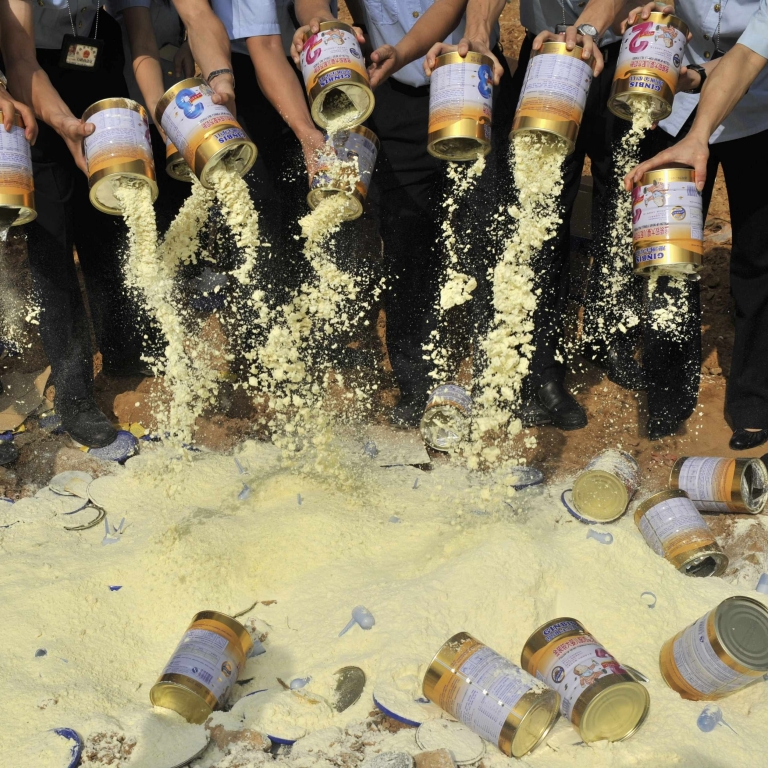
It’s hard to believe that it’s been eleven years since the Chinese milk scandal took place…and some families and young teenagers (who survived) are still suffering today. Ren Che, a thirteen-year-old boy who lives in southern Hunan province is on three sessions of kidney dialysis a week. Doctors found his kidneys full of stones when he was three. At least he survived. There were six babies that died from kidney stones (and other kidney damage) and an estimated 300,000 that suffered from tainted milk and infant formula. There were probably more.
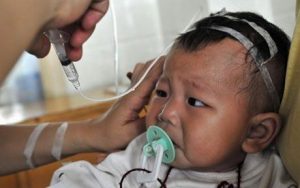
It was back in 2008 – as Beijing was getting ready to hold the Summer Olympics that the scandal broke. Twenty-two companies were found to have sold tainted product. The culprit was a chemical compound called melamine used in plastic and fertilizer production that somehow had made its way into baby formula. You may remember that melamine was also the culprit in tainted pet food here in the U.S. that killed thousands of family pets.
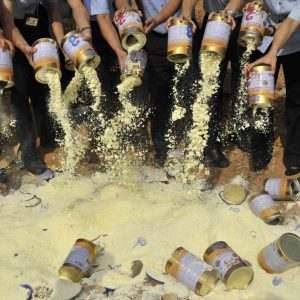
The incident destroyed the confidence of Chinese moms in Chinese-made baby formulas and a deep distrust still remains today. A recent survey showed that over half of the 10,000 people surveyed prefer a foreign brand for baby formula.
The result is a growing demand for foreign safe and natural organic baby foods and formulas…and sales are soaring. The overall growth rate of the infant formula market in China last year was 10.8 percent year-on-year while the sales of organic infant formula products rose 46.8 percent year on year (from Euromonitor International, a market research company). It comes as no surprise that several multinational companies including Nestle from Switzerland are stepping up their efforts and expanding their presence on e-commerce platforms. JD.com is one of the most popular e commerce platforms for buying foreign infant milk formula and rice cereal.
German organic infant formula and baby products producer HIPP showed annual growth of 20% in China and has set its sights on becoming the top premium baby product brand in China – it’s second largest market after Germany. (It doesn’t hurt that Hipp has donated 10 million yuan (US1.4 million dollars) this year to China Soong Ching Ling Foundation to help launch maternal health care classes in China and train more pediatricians – a smart marketing move on their part.
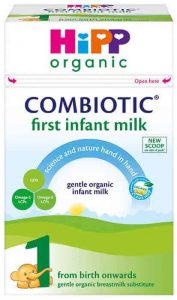
According to Stefan Hipp, global managing director and fourth generation heir of Hipp, a 120-year-old family firm …” those who put babies in the center of attention, bear great responsibility. That is the reason why our organic products are of extraordinary quality and produced without genetically modified organisms according to the European Union’s regulation for organic production.” The Hipp organic farms do not use chemical fertilizers or pesticides and they artificially remove weeds and pets using the natural, ecological chain. And they make sure that the consumer moms in China know this.
Zeng Yingpei lives in the southern city of Foshan and buys German baby formula for her two-year old child. She remembers the scandal and says she feels like foreign baby powder is better. “It only takes one mouse dropping to ruin the whole pot of porridge” she said.
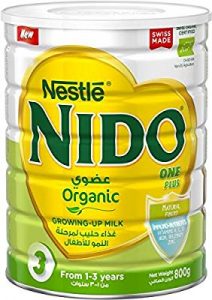
Nestle has also not been idle. It launched its first organic full cream milk powder product under the NIDO brand in China last year and looks for expansion in this high-end organic dairy segment of the market. According to Neilson Consulting, forty to fifty percent of Chinese consumers are willing to pay higher prices for natural, sustainable and organic products. Nestle also introduced Illuma 3 Organic Products for Chinese parents in 2017. Their research shows that sales of infant and maternity products grew by 33 percent year-on-year in China and a generation of “organic mothers” has been created!
From the U.S. formula maker Mead-Johnson comes grass-fed Enfagrow. It was introduced in September to Chinese consumers. Grass-fed is described as milk produced by cows that feed naturally on fresh leafy grass. So, while it is not organic, it focuses on a natural breeding environment for cows so that milk is produced under natural living conditions. It may take more time than “organic” for this grass-fed concept to gain popularity with the moms.
The Chinese created this demand for foreign-made organic baby formulas and other products themselves through the actions of a few companies cheating their own consumers eleven years ago. And the growing level of wealth in China’s middle class continues to drive the growth of all types of organic foods. Parents still don’t trust Chinese-made or local formulas, so it was an extremely expensive mistake. A greedy mistake. But it is one that foreign producers can now take advantage of.
By Lily Noon
Sources:
- Reuters Article: Ten Years after China’s infant milk tragedy Kim Kyung-Hoon
- China Daily Global Edition, Dec 4, 2019: Organic Infant Formula Makers Test New Waters as Sales Soar in China, Zhu Wenqian and Wang Zhuoqiong
- Wikipedia – 2008 Chinese Milk Scandal
- Forbes 7/16/2014 The 2008 Milk Scandal Revisited
- China Daily, September 21, 2015, Xu Wei
- Mintel: Untapped Opportunity in China’s Organic Baby Food Market, Lori Li
信じられないことですが、中国で粉ミルク汚染事件が発生してから、もう11年になります。でも、(死には至らなかったものの)健康被害を受けた子供たちとその家族は、今でもその影響に苛まれています。 湖南省南部に住むレン・チェ君(13歳)は、週3回、人工透析を受けています。3歳の時に腎臓が結石でいっぱいになっているのが発見されたのですが、かろうじて命は取り留めました。結石(および他の腎機能障害)で亡くなった赤ちゃんは6人、ほかに30万人が汚染粉ミルクの被害を受けたと見積もられています。おそらく実数はもっと多いでしょう。
この事件が発生したのは2008年。北京オリンピックの準備が進む最中のことでした。最終的に22社が、汚染ミルクを販売したとされました。問題の原因はメラミンという化学物質で、プラスチックや肥料の原材料ですが、これが赤ちゃん用の粉ミルクに混入していました。メラミンは、米国で数千匹というペットの命を奪ったペットフードの汚染物質であったことを覚えている人もいるかもしれません。
この事件によって、中国の母親の国産粉ミルクに対する信頼感は完全に失われました。今でも根深い不信感が残っていて、最近の調査では、回答者1万人のうち半数以上が外国ブランドの粉ミルクを好むと答えました。
この事件を経て、外国産の安全でナチュラルかつオーガニックなベビーフードや粉ミルクの需要が高まりました。実際、販売高は急成長しています。中国の乳幼児向け粉ミルク市場は、昨年、前年比10.8%の成長でしたが、そのうちオーガニック製品は46.8%の伸びとなりました(調査会社Euromonitor Internationalの調べ)。驚きには値しませんが、スイスのネスレをはじめとする多国籍企業が市場拡大を図っていて、Eコマースの販売ルートを増やしています。JD.comは、中国の消費者が外国産の赤ちゃん用粉ミルクやライスシリアルを買う際に最も人気のサイトのひとつです。
乳幼児向けのオーガニック食品を製造するドイツのHiPPは、中国での売上高を年20%拡大していて、中国の高級ベビーフード市場でトップのブランドになろうとしています。同社にとって、中国はドイツに次ぐ第2の市場です。HiPPは今年、中国宋慶齢基金会(China Soong Ching Ling Foundation)に1,000万元(約140万ドル)を寄付しました。妊娠中の健康管理に関するクラスを中国で開催するとともに、小児科医向けの研修を展開するための寄付金で、スマートなマーケティング戦略と言えそうです。
創業120年のHiPPの4代目経営者でグローバルマネージングディレクターを務めるステファン・ヒップ氏は、次のように語っています。「赤ちゃんにかかわる人には、大きな責任があります。当社のオーガニック製品が最高の品質を維持し、遺伝子組み換え作物を使用せず、EUのオーガニック生産基準に則っているのも、そのためです」。HiPPのオーガニック生産農家は、化学肥料や農薬を使用せず、生態系にとって自然な方法で雑草や害虫を除去しています。また、中国の消費者である母親に、そのことを伝えています。
広東省の仏山市に住むツェン・インペイさんは、2歳の子のためにドイツ製の粉ミルクを買っている一人です。スキャンダルのことを覚えていて、外国産のほうが優れていると感じるそうです。「スプーン一杯の過ちで鍋全体の料理が台無しになるものです」と語っています。
ネスレも傍観しているわけではありません。中国で昨年、同社初のオーガニックのフルクリーム粉ミルク製品を「NIDO」のブランド名で発売し、高級オーガニック乳製品市場の拡大を図っています。Neilson Consultingによると、中国の消費者の40~50%は、多少割高でもナチュラル、サステナブル、かつオーガニックな製品を買う意思があるそうです。ネスレは、このリサーチでは、中国の乳幼児・妊産婦向け製品の販売高が年33%成長し、「オーガニックマザー」と呼ばれる世代が形成されていることが示されています。
米国の粉ミルクメーカー、Mead Johnsonは、グラスフェッド(牧草飼育)の牛のミルクを原材料とする「Enfagrow」を投入しています。今年9月に中国で発売されました。乳牛が穀物の飼料ではなく、牧草の飼料で飼育されていることを意味します。オーガニックではありませんが、牛にとって自然な繁殖環境を重視して、自然な飼育法で生産された牛乳と言えます。「グラスフェッド」のコンセプトは、「オーガニック」に比べ、母親の間で人気を集めるのに時間がかかるかもしれません。
中国では、11年前に自国の消費者を裏切った数社の行動によって、この外国産のオーガニックなベビーフードや他の食品に対する需要が生じました。中国のミドルクラスの購買力の拡大とも相まって、あらゆる種類のオーガニック食品が引き続き成長しています。国産の粉ミルクはいまだに信用されていませんから、きわめて高価な過ちだったことが分かります。 利益に目のくらんだ過ちでもありました。しかし、外国のメーカーにとっては商機をもたらしています。
Lily Noon
出典:
- Reuters Article: Ten Years after China’s infant milk tragedy Kim Kyung-Hoon(ロイター通信、「粉ミルク事件から10年」、記者:Kim Kyung-Hoon)
- China Daily Global Edition, Dec 4, 2019: Organic Infant Formula Makers Test New Waters as Sales Soar in China, Zhu Wenqian and Wang Zhuoqiong(中国日報、2019年12月4日付け、「オーガニック粉ミルク・メーカー、中国の市場拡大で新製品投入」、記者:Zhu Wenqian、Wang Zhuoqiong)
- Wikipedia – 2008 Chinese Milk Scandal(ウィキペディア ― 2008年中国のミルク汚染事件)
- Forbes 7/16/2014 The 2008 Milk Scandal Revisited(フォーブス、2014年7月16日付け、「2008年ミルク汚染事件のその後」)
- China Daily, September 21, 2015, Xu Wei(中国日報、2015年9月21日付け、記者:Xu Wei)
- Mintel: Untapped Opportunity in China’s Organic Baby Food Market, Lori Li(ミンテル:中国のオーガニックベビーフード市場に手つかずの商機、著者:Lori Li)
